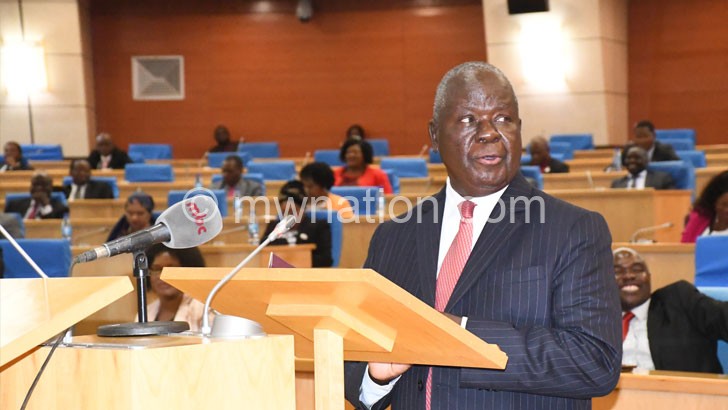Treasury explains IMF ecf cancellation
Ministry of Finance says it mutually agreed with the International Monetary Fund (IMF) to cancel the three-year Extended Credit Facility (ECF) programme following a change of policy by the new government.
Minister of Finance Felix Mlusu announced the cancellation of the three-year $107.7 million (about K80 billion) ECF arrangement approved on April 30 2018. The programme amount is equivalent to 56.25 percent of Malawi’s quota in the IMF to support the country’s economic and financial reforms.
In a written response yesterday, Ministry of F inance spokesperson Williams Banda said when government agrees on programme parameters with the global lender, they have to be adhered to for the duration of the programme.

For example, he said the government emphasised on the policy change on subsidy programme, whose allocation increased from around K40 billion in the previous budget to K160 billion in the proposed 2020/21 National Budget.
Said Banda: “Policy changes were inevitable with the change of government as focus differs.
“There are no any risks in cancelling the ECF because it has given the new government a chance to renegotiate the programme in line with its policies.”
He said the IMF agreed with government’s proposal to have a second Rapid Credit Facility (RCF) in the interim, which combines budget support and balance of payment support.
RCF is a fast-disbursing instrument amounting to $100 million (about K75 billion).
Banda said government will soon commence negotiating for a new facility.
The IMF country office was yet to respond to our questions.
On Friday, Mlusu announced the cancellation of the ECF programme when he presented the proposed K2.2 trillion 2020/21 National Budget in Parliament in Lilongwe, saying change of government policy necessitated the move.
Commenting on the issue, Betchani Tchereni, associate professor of economics at The Polytechnic, a constituent college of the University of Malawi, said in written response yesterday that the ECF is intended for countries whose macroeconomic environment is unstable and volatile needing some assistance for balance of payment imbalances.
He said the ECF has also become a vehicle through which countries under panic use to get foreign currency.
Said Tchereni: “The decision to cancel ECF concerns issues to do with the need to borrow sustainably for investment projects and at a cheaper price.
“Therefore, it is better to negotiate long-term loans intended for infrastructure development.”
Centre for Research and Consultancy executive director Milward Tobias said yesterday that the ECF programme has quick repayment conditions and helps the recipient country to retire it quickly without passing repayment burden to next generations.
Meanwhile, the global lender has been disbursing funds under the RCF to help Malawi meet the urgent balance of payment needs stemming from the economic impact of Covid-19 pandemic.





